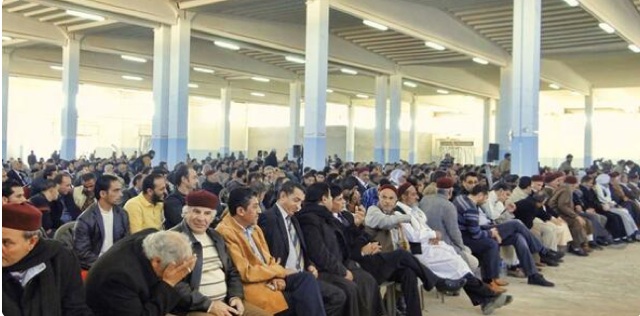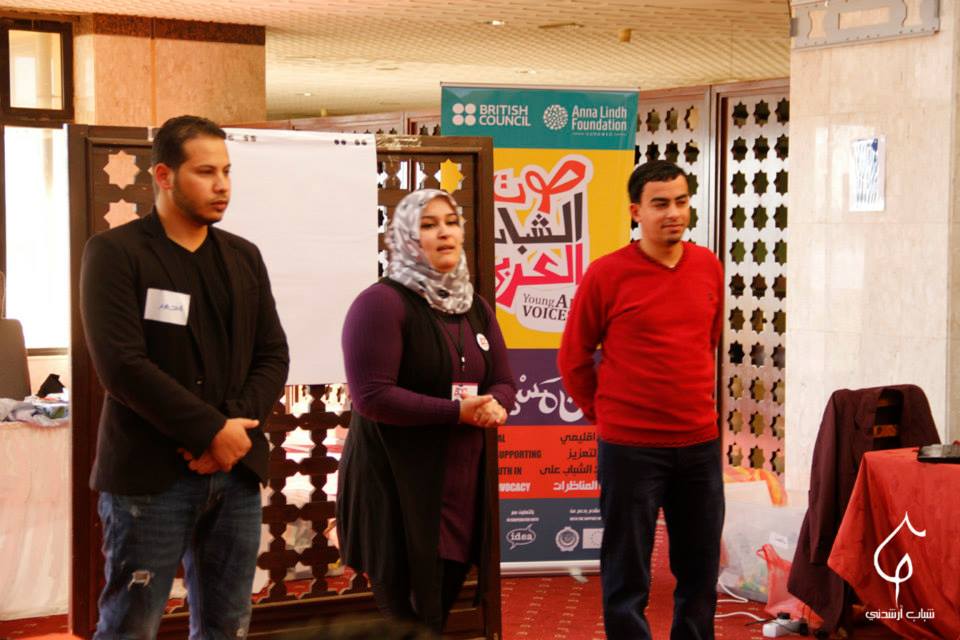By Ahmed Obeidi.

Benghazi, 22 December 2013:
Tribal chiefs and supporters of federalism have warned the government, Congress and the Libya Revolutionaries Operations . . .[restrict]Room (LROR) that they will not stand aside if force is used to end the closure of the eastern oil terminals. They also insisted that Cyrenaica would export oil independently of the NOC
At a meeting in Benghazi yesterday, Cyrenaica tribal elders and federalism activists said that any action or threat of action against the region or those who were “protecting” its ports and oil fields would be considered an assault on the people of Cyrenaica as a whole.
Last week, the Congress’ Oil and Energy Committee said that it was giving the government a week to reopen the oil terminals, otherwise it would advise Congress to authorise the use of force. Members of the LROR also said that they would take unilateral action against Ibrahim Jadhran, head of the self-styled Political Bureau of Cyrenaica, and his forces if the terminals did not reopen.
The Cyrenaica elders yesterday warned the LROR, primarily drawn from western Libya, that it should not meddle in the country’s social fabric. Doing so, they said, could fuel moves for separatism.
Echoing Jadhran’s demands, the tribal elders demanded the establishment of an independent committee to look into allegations of corruption in oil sales. They also demand the Public Auditor draw up a report on Libyan funds invested aboard, frozen assets and past contracts awarded.
“We are here today to send a clear message that not only action, but the suggestion of action, will end the patience of residents in eastern Libya,” Ryad Abu Mtary, an activist at the meeting, told the Libya Herald. He said had attended because of threats made by both the government and GNC to the young people of Cyrenaica who, he claimed, were protecting the ports in eastern Libya. “If you disagree with someone, you don’t attack an entire region”, he added.
“I came [to the meeting] to send a message to the feeble government that any military action is a second March 19th aggression [referring to the 19 March 2011 assault on Benghazi by Qaddafi forces] and we have the resources and capabilities to fight back any invasion,” Younis Al-Zwaya likewise told this newspaper.
However, in his opening speech to the meeting, Sheikh Al-Lawati Al-Agoria said that no one genuinely believed that military action would happen.
The real question now, he said, was when Cyrenaica would start to export oil.
“In Tobruk [where Cyrenaica federalists met recently] we asked for dialogue. It’s been a month now. Cyrenaica is well known. Its youths liberated Libya and today they intend to export its oil. They will export the oil tomorrow, or after tomorrow. Cyrenaica will export its oil.”
Sheikh Ali Bohlil Al-Obeidi whose presence was loudly applauded told attendees that “when Cyrenaica exports its oil all of Libya will be well.”
The issue of participation in the upcoming elections for the 60-member constitutional drafting committee produced conflicting views among those at the meeting.
“I support full participation in the elections even though I have some misgivings about the electoral system designed to benefit specific political parties and ideologies. Since 1963 [when the federal constitution of 1951 was replaced], the political system in Libya has been unstable and today the choice is between a simple or complex system of government, a system that benefits all Libyans equally. I am for federalism,” said Abu Mtary Ryad.
Another federalist at the meeting, Ali Al-Denaly, said that he supported participation in the elections.
“We need to focus on electing 20 true nationalist to represent Cyrenaica in the committee not individuals affiliated with political parties or having ideologies foreign to Libyan culture,” he said.
However, the head of the of Cyrenaica Council’s Media department, Dr Jaballa said he was opposed to the elections. “We already have a internationally-recognised constitution [the 1951 Constitution], we don’t need to have elections. The 1951 Constitution provides for a federalist system of governance. I believe today’s meeting is about either federalism or self determination,” he said. A media professor who has taught at a number of higher education institutions in Texas since 2001, Jaballa said he hoped “in 2014, Libyans will be happy under a federal system”. He added: “We have every right to sell the oil resource in our region. We should also control our entry points. Our main difficulty now is lack of funding which could be resolved through the export of oil.”
His views were backed by Younis Al-Zwaya: “I am against participation because the electoral process was drafted by the tarnished General National Congress is only likely to produce a defective constitution. We have the 1951 constitution.”
For Al-Motaz El-Aribe, a young supporter of federalism, the problem is Libya’s size. “Libya is a large country difficult to run by a centralist system. We don’t have a problem with individuals but with a system that is incompetent and corrupt.”
He claimed that Cyrenaica was not getting a fair share of investment. “How do you expect us to run our affairs if we don’t have access to education and scholarships which seem to be benefiting young people in other regions. Those accusing us of trying to split this country are ignoring Libya’s social fabric linking Libyans across regions and communities.”
The sense of eastern Libya being discriminated was strong at the meeting.
“I have three messages for Libyans today,” Abu Mtary said. “First, calling people traitors because of their thoughts is unacceptable; we [in Cyrenaica] could do the same. Secondly, we don’t believe in dividing this country. Libya is one with justice and equality for all. And finally, the threats of aggressive actions are only cheap words designed to agitate citizens and will only result in a speedy dismissal of the government and the GNC.” [/restrict]








